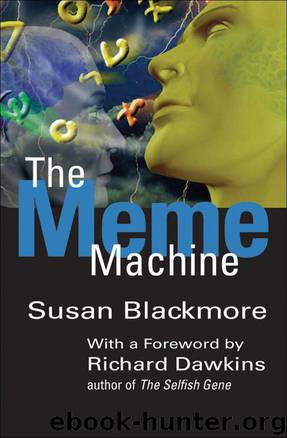The Meme Machine (Popular Science) by Blackmore Susan

Author:Blackmore, Susan [Blackmore, Susan]
Language: eng
Format: epub
Publisher: Oxford University Press
Published: 2000-03-15T23:00:00+00:00
Memes and mates
There are two main ways in which memetic theory differs from a purely sociobiological account of sex. First, memes have been around for at least 2.5 million years; coevolving with genes and influencing sexual behaviour and mate choice. Second, memes are now well off the leash and during the last century sexual memes have influenced our lives in ways that have little or nothing to do with genes.
Let us begin with mate choice. The main difference between the two theories is this. According to sociobiology our choice of mates, and whom we find attractive, should ultimately come back to the question of genetic advantage. Our modern life may complicate things, but essentially we should choose to mate with people who would, in the environment of our evolutionary past, have helped to increase our genetic legacy.
According to (my version of) memetics, mate choice is influenced not only by genetic advantage but also by memetic advantage. One of my key assumptions has been that, once memes arose in our far past, natural selection would have begun to favour people who chose to mate with the best imitators or the best users and spreaders of memes. This was part of my argument for the memetic driving of genes for bigger brains and language, but it also leads naturally to some conclusions about mate choice. As memetic competition took off in our far past, so the direction the memes took would have affected mate choice. People would have tended to mate with the best meme–spreaders, but what constituted the best meme–spreaders depended on what the memes were doing at the time. It is in this sense that the memes began to call the shots.
Let us consider some examples. In an early hunter–gatherer society a man who was especially good at imitation would have been able to copy the latest hunting skills or stone tool technology and hence would have gained a biological advantage. And a woman who mated with him would be more likely to have children who shared that imitation ability and that advantage. So how would she choose the right man? I suggest she would have to look for signs, not just of having the good tools because they might change, but of being a good imitator in general. This is the critical point – in a world with memes, signs of being a good imitator change as fast as the memes change. Genes for choosing men who could make and use the old stone tools might once have had an advantage but as more memes arose and spread they would not. Instead, genes for choosing men with the general ability to imitate, or even to innovate, would fare better. In a hunter–gatherer society such signs might include making the best tools, singing the best songs, wearing the most stylish clothes or body paint, or appearing to have magical or healing powers. The direction which memetic evolution took would have influenced the genes.
If this argument is right we would expect
Download
This site does not store any files on its server. We only index and link to content provided by other sites. Please contact the content providers to delete copyright contents if any and email us, we'll remove relevant links or contents immediately.
| Anthropology | Archaeology |
| Philosophy | Politics & Government |
| Social Sciences | Sociology |
| Women's Studies |
Born to Run: by Christopher McDougall(7124)
The Leavers by Lisa Ko(6948)
iGen by Jean M. Twenge(5414)
Sapiens by Yuval Noah Harari(5369)
Spare by Prince Harry The Duke of Sussex(5194)
The Kite Runner by Khaled Hosseini(5176)
Machine Learning at Scale with H2O by Gregory Keys | David Whiting(4312)
Bullshit Jobs by David Graeber(4190)
Never by Ken Follett(3953)
Goodbye Paradise(3809)
Livewired by David Eagleman(3772)
Fairy Tale by Stephen King(3391)
A Dictionary of Sociology by Unknown(3084)
Harry Potter 4 - Harry Potter and The Goblet of Fire by J.K.Rowling(3073)
The Social Psychology of Inequality by Unknown(3028)
The Club by A.L. Brooks(2925)
Will by Will Smith(2919)
0041152001443424520 .pdf by Unknown(2845)
People of the Earth: An Introduction to World Prehistory by Dr. Brian Fagan & Nadia Durrani(2736)
